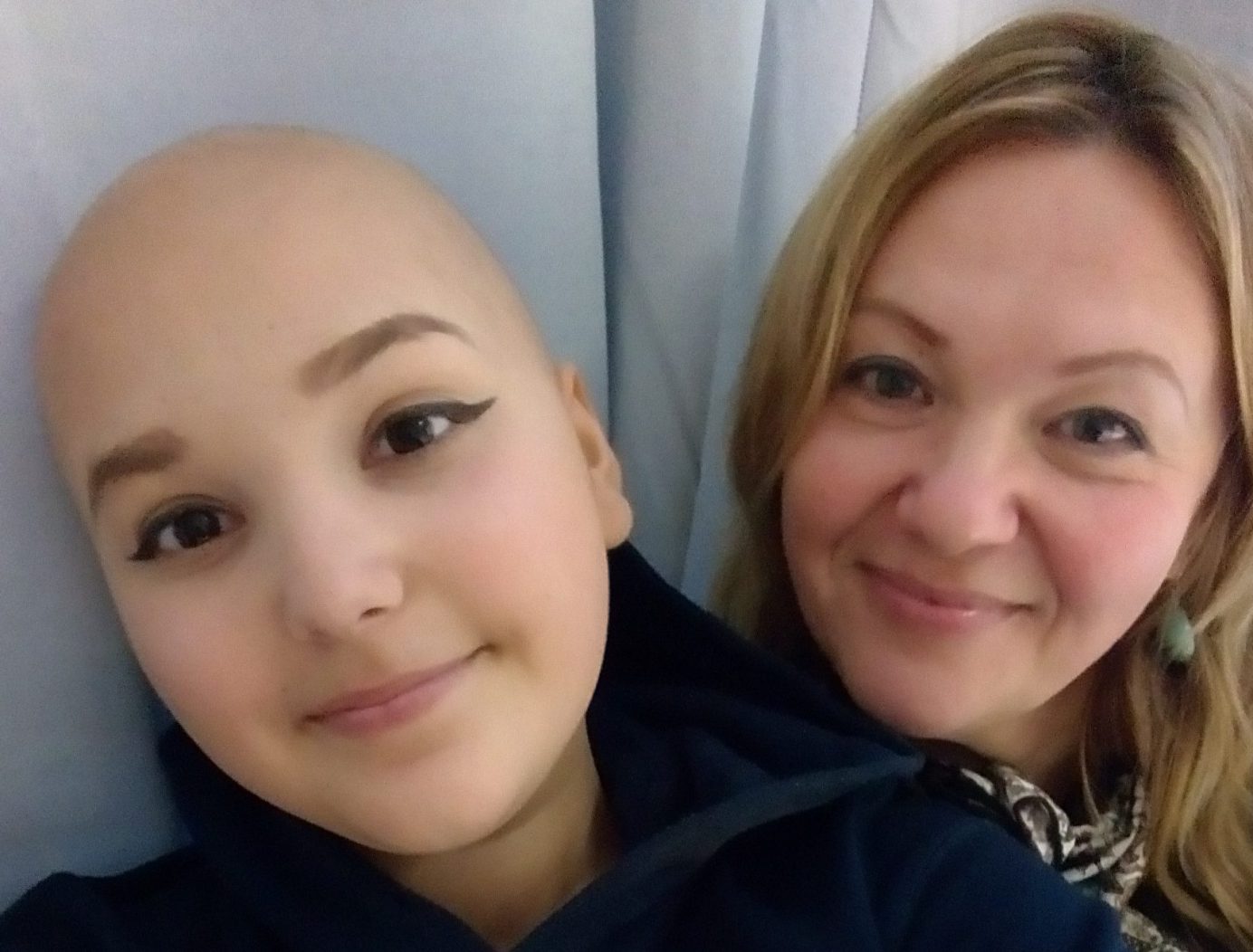
Safe Haven: Sabrina's Story
September 18, 2019
Sabrina is a survivor and a super brave 15-year-old who was supported by our Charity while being diagnosed for Hodgkin lymphoma; cancer that invades the vessels and glands of the lymphatic system (part of the immune system) attacking the white blood cells that fight infections.
After five weeks of feeling unwell but not knowing why, Sabrina was diagnosed in August 2018 and endured six rounds of chemotherapy before being declared cancer-free earlier this year. Throughout her time in the hospital, Sabrina’s family stayed close to her side in Ronald McDonald House Southampton for the second time since the first diagnosis.
It has been a lot for a young teenager to deal with and we are very grateful for Sabrina’s raw and honest account of how she coped with cancer. Her mum, Elena, was with her every step of the way and tells us how her daughter’s cancer affected her as a parent.
Here is Sabrina and Elena’s emotional story:
“My first round of chemo was the most difficult,” recalls Sabrina.
“I had been ill with lots of different infections following my first round of chemo. I was getting dizzy and having blackouts when I first started getting ill. Everything I ate I threw up, as I progressively got sicker. I was exhausted, suffered painful stomach cramps and often didn’t have the strength to walk. The chemo made me feel worse and afterwards I spent a week in the hospital.
“The treatment then got easier, but in general the chemo made me feel nauseous and tired. However, it was a relief to be getting the medical help I needed. The not knowing was quite an isolating time; I was in a room away from everyone in case I caught another child’s infection and didn’t meet anyone who understood what I was going through until I was diagnosed and was receiving treatment.
“It all started over the summer school holiday. The first day of school was my first day of chemo. I didn’t tell many people that I was sick since I didn’t think it was serious. I didn’t know what was wrong with me, so there was no point in worrying people.
“Once school started, I began getting messages from people and hearing talk about where I was and what I was doing. We decided to speak to the school about it and I decided to come into school and hold an assembly to explain to my year group to what my situation was and why I hadn’t been in school. The hospital gave me a DVD that explains to children how to deal with someone they know who has cancer which they watched and then were able to ask questions.
“I found that assembly really difficult since my diagnosis was still fresh and I still hadn’t come to terms with my illness and the severity of it. It was mainly the teachers that talked as I was still very emotional. I just wanted everyone to understand what was happening so I could move on and not have to talk about it again. The reaction received was interesting.
“People I wouldn’t expect talked to me and told me how proud they were of me. I gained a few more friends from it. People cared who I didn’t expect to care. I definitely got more respect from people.”
“My mum went everywhere I went; she was always with me. She’d go to the hospital with me, look after me – did everything. My sister was really upset and wanted to stay with me and miss her final year at university. I insisted she went back because although it would have been lovely to have her with me, she couldn’t change anything, and I was getting the treatment I needed.
“All of my family were really upset, but they honoured my wishes and continued with their lives as much as possible. I didn’t want my cancer to affect our lives; it had already affected us so much. It was difficult to face life with cancer, but I didn’t want it to go on affecting us after it was over. I’m done now and trying to get back to normal and if everyone had stopped what they were doing, we’d all be starting again and asking what do we do now? My sister will be graduating soon and will be starting a new career as a police officer, so it all worked out for the best.
“Ronald McDonald House provided shelter away from the hospital for the long time I was there. It was a haven for me during my diagnosis. The hospital was a bit uncomfortable because everyone was sick, and it was an unhappy environment.
“When I was waiting for test results, we would escape and go to Ronald McDonald House Southampton and watch movies or play cards. I could also sit in the garden, breathe fresh air and have some time to myself.
“All the staff were amazing and very supportive. Even when I was at my lowest, they would cheer me up.”
“It was a happy place for us. Even when I was at my sickest, I only have good memories of the Ronald McDonald House. The staff were always able to lift my spirits – they weren’t always able to help me physically, but mentally they really helped. They found out what type of person I was and didn’t judge me on my cancer. The staff understood what I was going through without having to talk to me about it all the time.”
Mum Elena recalled what it was like to receive the news that Sabrina had cancer: “It was a real shock for the whole family. I remember feeling numb and even deaf; I could hear the doctor but also my heart beating in my ears. I couldn’t believe it and it took me a while to accept it. All my family are in Russia and couldn’t support me. It felt like I had the whole world on my shoulders.
“When you’re faced with a challenge like this you have no choice but to become stronger and be there for your loved ones. My motivation to get me through this was the vision that I’ve always had for Sabrina and her future. Her illness was never part of my vision, and subsequently, I refused to believe that she could not overcome this.
“It’s still very difficult emotionally for all of us, but especially Sabrina. She was coping on her own, but began crying all the time and needed to understand her feelings better in order to recover. So, we got some advice from a professional and things have improved.”
Sabrina said: “It’s important to recognise that you’re upset and to just cry. It’s not like you have to always be brave, strong and confident. If you want to cry – cry – you deserve it; you’ve been through so much.
“If you need to scream and shout – do it; don’t bottle it up. I did and I got frustrated with myself because I couldn’t do the things I used to or wanted to and didn’t tell anyone how I was feeling. I bottled it up and it got worse and worse. Now I talk about it.
“It’s still difficult and I get upset but I know I’ll get to a point eventually when all of this is just a memory. It’ll take time, I can’t push myself to get over it but eventually, I will. I have to be patient with myself no matter how much I want this to be over.”
“As a parent, it’s very difficult to cope with,” added Elena. “You want to do everything for your children. I wasn’t letting myself be emotional or happy – I just wanted Sabrina to be well. I think it’s important for parents to remember themselves and look after their health and get support so you can be strong for your child but in the right way.”
Sabrina added: “My mum has a special bond with me, so she felt the pain I was having. She wanted to do everything she could for me and needed a way to relieve her own pain.”
Once declared cancer-free, Sabrina returned to school. “I’m glad I’ve gone back because I was at home and in the hospital for so long that it was driving me crazy! I’ve had to pace myself at school, so at the moment I’m only part-time and studying certain subjects. I can’t push myself because when my body is too stressed or tired, it instantly tells me to slow down.”
We asked Sabrina and Elena to offer some advice for those recently diagnosed or undergoing treatment.
Elena said: “It’s important that no matter how hard it is and how pessimistic you feel about tomorrow, you have to be strong and positive.
“Don’t let yourself think the fight is over because you’re too tired, instead you must keep going and not think about yesterday. Think about today and how you’re going to re-charge for tomorrow.”
“Just don’t push too hard,” added Sabrina. “That was the one thing I learned. I expected too much from myself and that’s when it gets difficult because you’re frustrated by what you’ve achieved. It’s best to take it day by day and don’t expect too much from yourself.
“There are lots of people who have been diagnosed and have come out of the other end and you can read their stories online. Let them be an inspiration for you. It’ll help you understand what you’re going through.
“Right now, it’s bad, but no matter what – you’ll get through it.”
Help us provide free home away from home accommodation to support families with children in hospital with a donation.
